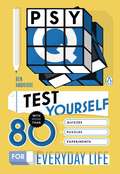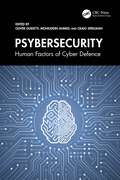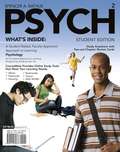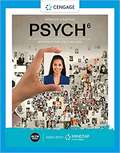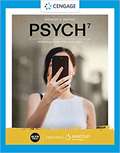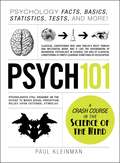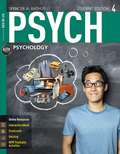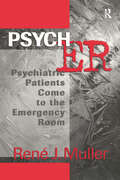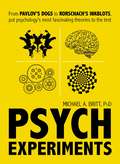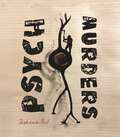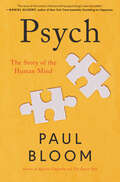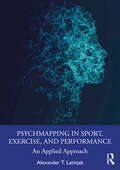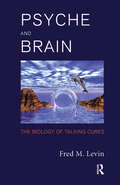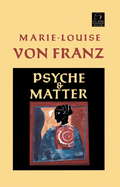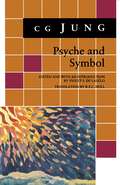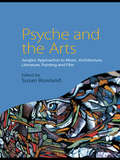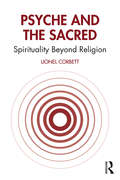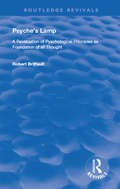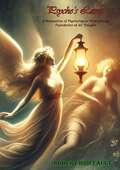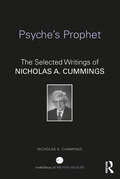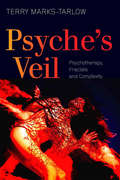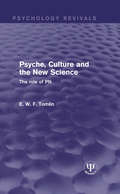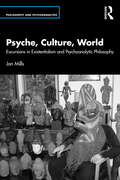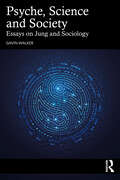- Table View
- List View
Psy-Q
by Ben AmbridgePsychology 101 as you wish it were taught: a collection of entertaining experiments, quizzes, jokes, and interactive exercisesPsychology is the study of mind and behavior: how and why people do absolutely everything that people do, from the most life-changing event such as choosing a partner, to the most humdrum, such as having an extra donut. Ben Ambridge takes these findings and invites the reader to test their knowledge of themselves, their friends, and their families through quizzes, jokes, and games. You'll measure your personality, intelligence, moral values, skill at drawing, capacity for logical reasoning, and more--all of it adding up to a greater knowledge of yourself, a higher "Psy-Q". Lighthearted, fun, and accessible, this is the perfect introduction to psychology that can be fully enjoyed and appreciated by readers of all ages.Take Dr. Ben's quizzes to learn:- If listening to Mozart makes you smarter- Whether or not your boss is a psychopath- How good you are at waiting for a reward (and why it matters)- Why we find symmetrical faces more attractive- What your taste in art says about you
Psybersecurity: Human Factors of Cyber Defence
by Mohiuddin Ahmed Craig Speelman Oliver GuidettiPsybersecurity: Human Factors of Cyber Defence is a clarion call to action in the face of a stark reality: over 90% of cyberattacks exploit human vulnerabilities, as highlighted by the 2022 Global Risks Report from the World Economic Forum. This gap between the rapid advancement of cyber security technologies and the slower pace of development in human-centric defences poses a formidable challenge to national security and personal safety. Amidst the dazzling progress of AI technologies like ChatGPT and Microsoft Security Co-Pilot, the human element of cyber security remains critically underdeveloped.Set against the backdrop of the Australian government's ambitious goal to become the world's most cybersecure nation by 2030, this book embarks on a mission to address the overlooked human factors in cyber defence. It advocates for a balanced approach that not only relies on technological advancements but also significantly enhances the human aspects of cyber security.Through an interdisciplinary exploration, Psybersecurity delves into how cyberthreats exploit human vulnerabilities and offers innovative solutions for building resilience against these vulnerabilities. It examines the necessity for cyber security strategies that encompass psychological insights, systemic resilience, and the mitigation of human errors, particularly within critical infrastructures and cyber-physical systems (CPS).Furthermore, this work critiques existing cyber security education frameworks, proposing a comprehensive curriculum that equips individuals with technical skills and the behavioural competencies needed to navigate the cyber landscape ethically and effectively. It also addresses AI's ethical dilemmas and psychological impacts, offering a forward-looking perspective on combating AI-driven harassment and endorsing a new field of study: "Psybersecurity."Psybersecurity: Human Factors of Cyber Defence aims to bridge the gap between cyber security and human sciences, ignite a transformation in understanding, and fortify our digital world. It is an essential read for academics, professionals, and anyone committed to building a safer, more resilient cyber future in alignment with Australia's 2030 vision.
Psych
by Spencer A. RathusCreated through a "student-tested, faculty-approved" review process with over 150 students and faculty, PSYCH 2 is an engaging and accessible solution to accommodate the diverse lifestyles of today's learners.
Psych
by Spencer A. RathusLearn Introductory/General Psychology YOUR Way with PSYCH! PSYCH's easy-reference, textbook presents course content through visually engaging chapters. With the textbook or on its own, PSYCH MindTap allows you to learn on your terms. Read or listen to textbooks and study with the aid of instructor notifications, flashcards and practice quizzes. Track your scores and stay motivated toward your goals. <p><p> Whether you have more work to do or are ahead of the curve, you'll know where you need to focus your efforts. And the MindTap Green Dot will charge your confidence along the way. When it's time to study, everything you've flagged or noted can be gathered into a guide you can organize.
Psych (Mindtap Course List)
by Spencer A. RathusLearn about psychology YOUR Way with Rathus' PSYCH, 7th edition, which combines the best of print and online resources! PSYCH's easy-reference textbook presents course content through visually engaging chapters. With the textbook or on its own, PSYCH MindTap allows you to learn on your terms. Read or listen to textbooks and study with the aid of instructor notifications, flashcards and practice quizzes. Track your scores and stay motivated toward your goals. Whether you have more work to do or are ahead of the curve, you'll know where you need to focus your efforts. And the MindTap Green Dot will charge your confidence along the way. When it's time to study, everything you've flagged or noted can be gathered into a guide you can organize. Inspiring quotes from psychologists, authors and celebrities will motivate you to dive deeper, while Truth-or-Fiction questions enable you to check your understanding.
Psych 101: Psychology Facts, Basics, Statistics, Tests, and More! (Adams 101)
by Paul KleinmanA hands-on approach to exploring the human mindToo often, textbooks turn the noteworthy theories, principles, and experiments of psychology into tedious discourse that even Freud would want to repress. Psych 101 cuts out the boring details and statistics, and instead, gives you a lesson in psychology that keeps you engaged - and your synapses firing.From personality quizzes and the Rorschach Blot Test to B.F. Skinner and the stages of development, this primer for human behavior is packed with hundreds of entertaining psychology basics and quizzes you can't get anywhere else.So whether you're looking to unravel the intricacies of the mind, or just want to find out what makes your friends tick, Psych 101 has all the answers - even the ones you didn't know you were looking for.
Psych 4
by Spencer A. RathusPSYCH 4 maximizes students' effort and engagement by empowering them to direct their own learning, through a single, affordable course solution. PSYCH 4 offers full coverage of course concepts through unique resources and features that mirror the natural study habits of students and that are accompanied by straightforward assignment options for instructors.
Psych ER: Psychiatric Patients Come to the Emergency Room
by Rene J. MullerDrawing on the experience of evaluating over 2000 emergency room patients, René Muller explores the important role of psychiatry in emergency room medicine. He discusses some of his most challenging cases, showing how psychiatry comes to the aid of medicine in managing the crises - real, imagined, and contrived - that are the everyday fare of clinicians who work in the ER. We are introduced to a world in which lies are exposed, manipulations revealed, diagnoses made, medications adjusted, and even very brief psychotherapy attempted. Muller begins with patient narratives rooted in the mental disorders most commonly encountered in the ER: Depression, panic disorder, drug dependence, bipolar depression, bipolar mania, schizophrenia, and Alzheimer's dementia. These stories pave the way for more puzzling ER cases, which Muller gathers into sections of "Veiled and Bizarre Stories" and "Stories with a Medical Component." He introduces us to the meanings of ER malingering and offers hard-won insights into managing "dumps" (when patients are dumped into the ER by families, police, doctors) and "stumbles" (when patients' bizarre behavior lands them in the ER). The stories patients tell - and the questions these stories raise - drive Muller's text. A young man has seriously overdosed, but with what? Why has a successfully medicated schizophrenic suddenly begun hearing voices again? And what are we to make of a patient who is willing to risk death attempting to "drown" his hiccups by drinking up to 12 liters of fluid a day? For these and equally fascinating questions, Muller is a sure-handed guide, working his way through one ER challenge after another with psychiatric acumen and a balanced appreciation of the medical, custodial, socioeconomic, and legal dimensions of ER work. An intriguing account of the competing agendas that enter into the handling of emergencies, Psych ER is also a compilation of evocative patient stories about the subjective experience of being ill.
Psych Experiments: From Pavlov's dogs to Rorschach's inkblots, put psychology's most fascinating studies to the test
by Michael A BrittPsychology's most famous theories--played out in real life! Forget the labs and lecture halls. You can conduct your very own psych experiments at home! Famous psychological experiments--from Freud's ego to the Skinner box--have changed the way science views human behavior. But how do these tests really work? In Psych Experiments, you'll learn how to test out these theories and experiments for yourself...no psychology degree required! Guided by Michael A. Britt, creator of popular podcast The Psych Files, you can conduct your own experiments when browsing your favorite websites (to test the "curiosity effect"), in restaurants (learning how to increase your tips), when presented with advertisements (you'd be surprised how much you're influenced by the color red), and even right on your smartphone (and why you panic when you can't find it). You'll even figure out how contagious yawning works! With this compulsively readable little book, you won't just read about the history of psychology--you'll live it!
Psych Experiments: From Pavlov's dogs to Rorschach's inkblots, put psychology's most fascinating studies to the test
by Michael A. BrittPsychology's most famous theories--played out in real life! Forget the labs and lecture halls. You can conduct your very own psych experiments at home! Famous psychological experiments--from Freud's ego to the Skinner box--have changed the way science views human behavior. But how do these tests really work? In Psych Experiments, you'll learn how to test out these theories and experiments for yourself...no psychology degree required! Guided by Michael A. Britt, creator of popular podcast The Psych Files, you can conduct your own experiments when browsing your favorite websites (to test the "curiosity effect"), in restaurants (learning how to increase your tips), when presented with advertisements (you'd be surprised how much you're influenced by the color red), and even right on your smartphone (and why you panic when you can't find it). You'll even figure out how contagious yawning works! With this compulsively readable little book, you won't just read about the history of psychology--you'll live it!
Psych Murders (Made in Michigan Writers Series)
by Stephanie HeitStephanie Heit’s hybrid memoir poem blasts the page electric and documents her experience of shock treatment. Using a powerful mélange of experimental forms, she traces her queer mad bodymind through breathlessness, damage, refusal, and memory loss as it shifts in and out of locked psychiatric wards and extreme bipolar states. Heit survives to give readers access to this somatic, visceral rendering of a bipolar life complete with sardonic humor, while showing us the dire need for new paradigms of mental health care outside closets, attics, prisons, and wards. Psych Murders adds a vital layer of lived experience of electroshocks and suicidal ideation to the growing body of literature of madness and mental health difference.
Psych: The Story of the Human Mind
by Paul BloomA Next Big Idea Club Must-ReadA compelling and accessible new perspective on the modern science of psychology, based on one of Yale’s most popular courses of all timeHow does the brain—a three-pound wrinkly mass—give rise to intelligence and conscious experience? Was Freud right that we are all plagued by forbidden sexual desires? What is the function of emotions such as disgust, gratitude, and shame? Renowned psychologist Paul Bloom answers these questions and many more in Psych, his riveting new book about the science of the mind.Psych is an expert and passionate guide to the most intimate aspects of our nature, serving up the equivalent of a serious university course while being funny, engaging, and full of memorable anecdotes. But Psych is much more than a comprehensive overview of the field of psychology. Bloom reveals what psychology can tell us about the most pressing moral and political issues of our time—including belief in conspiracy theories, the role of genes in explaining human differences, and the nature of prejudice and hatred.Bloom also shows how psychology can give us practical insights into important issues—from the treatment of mental illnesses such as depression and anxiety to the best way to lead happy and fulfilling lives. Psych is an engrossing guide to the most important topic there is: it is the story of us.
PsychMapping in Sport, Exercise, and Performance: An Applied Approach
by Alexander T LatinjakUnderstanding why we act the way we do is key to fostering success. This book introduces PsychMapping, a unique model that visually and philosophically guides readers through the complexities of human behaviour. The holistic approach reveals how different psychological aspects interact and influence each other.The chapters follow the logic of the PsychMapping model, a map of all the key aspects in sport, exercise, and performance psychology. Each chapter is an opportunity for self-reflection and a perfect introduction for anyone interested in exploring the psychological aspects of human behaviour. Packed with practical experiences and real-world case studies, the book applies theories to life, making complex concepts accessible and actionable. A standout feature for professionals is the detailed self-reflection exercise, designed to enhance applied practice.PsychMapping in Sport, Exercise, and Performance is enriching for students, practitioners, and anyone eager to explore the psychological aspects of human behaviour.
Psyche and Brain: The Biology of Talking Cures
by Fred M. LevinThis book contains essential data necessary to develop both a learning theory and a theory of therapeutic change for psychoanalysis. It approaches how the mind-brain deals with the acquisition, transfer, modification, and utilization of information.
Psyche and Matter
by Marie-Louise von FranzTwelve essays by the distinguished analyst Marie-Louise von Franz--five of them appearing in English for the first time--discuss synchronicity, number and time, and contemporary areas of rapprochement between the natural sciences and analytical psychology with regard to the relationship between mind and matter. This last question is among the most crucial today for fields as varied as microphysics, psychosomatic medicine, biology, quantum physics, and depth psychology.
Psyche and Symbol: A Selection from the Writings of C.G. Jung (Bollingen Series (General) #119)
by C. G. JungThe archetypes of human experience which derive from the deepest unconscious mind and reveal themselves in the universal symbols of art and religion as well as in the individual symbolic creations of particular people are, for C. G. Jung, the key to the cure of souls, the cornerstone of his therapeutic work. This volume explains the function and origin of these symbols. Here the reader will find not only a general orientation to Jung's point of view but extensive studies of the symbolic process and its integrating function in human psychology as it is reflected in the characteristic spiritual productions of Europe and Asia. Violet de Laszlo has selected for inclusion in Psyche and Symbol five selections from Aion: "The Ego," "The Shadow," "The Syzygy: Anima and Animus," "The Self," and "Christ, A Symbol of the Self." The book continues with "The Phenomenology of the Spirit in Fairy Tales," "The Psychology of the Child Archetype," and "Transformation Symbolism in the Mass." Also included are the foreword to the Cary Banes translation of the I Ching, two chapters from Synchronicity: An Acausal Connecting Principle, "Psychological Commentary on The Tibetan Book of the Dead," and "Commentary on The Secret of the Golden Flower."
Psyche and the Arts: Jungian Approaches to Music, Architecture, Literature, Painting and Film
by Susan RowlandDoes art connect the individual psyche to history and culture? Psyche and the Arts challenges existing ideas about the relationship between Jung and art, and offers exciting new dimensions to key issues such as the role of image in popular culture, and the division of psyche and matter in art form. Divided into three sections - Getting into Art, Challenging the Critical Space and Interpreting Art in the World - the text shows how Jungian ideas can work with the arts to illuminate both psychological theory and aesthetic response. Psyche and the Arts offers new critical visions of literature, film, music, architecture and painting, as something alive in the experience of creators and audiences challenging previous Jungian criticism. This approach demonstrates Jung’s own belief that art is a healing response to collective cultural norms. This diverse yet focused collection from international contributors invites the reader to seek personal and cultural value in the arts, and will be essential reading for Jungian analysts, trainees and those more generally interested in the arts.
Psyche and the Sacred: Spirituality Beyond Religion
by Lionel CorbettThis book presents an approach to spirituality based on direct personal experience of the sacred. Using the language and insights of depth psychology, Corbett outlines the intimate relationship between spiritual experience and the psychology of the individual, unveiling the seamless continuity between the personal and transpersonal dimensions of the psyche. His discussion runs the gamut of spiritual concerns, from the problem of evil to the riddle of pain and suffering. Drawing upon his psychotherapeutic practice as well as on the experiences of characters from our religious heritage, Corbett explores the various portals through which the sacred presents itself to us: dreams, visions, nature, the body, relationships, psychopathology, and creative work. Referring extensively to Jung’s writings on religion, but also to contemporary psychoanalytic theory, Corbett gives form to the new spirituality that is emerging alongside the world’s great religious traditions. For those seeking alternative forms of spirituality beyond the Judeo-Christian tradition, this volume will be a useful guide on the journey.
Psyche's Lamp: A Revaluation of Pyschological Principles as Foundation of All Thought (Routledge Revivals)
by Robert BriffaultOriginally published in 1921, Psyche's Lamp reminds the reader that all thought and discussion, to whatever aspect of confronting problems, social, political, ethical, vital and personal, they may be directed, posit psychological premises. In the darkness and confusion of a human world under reconstrction, where immemorial landmarks lie strewn and buried under the debris of collapsed super-structures, we shall vainly endeavour to thread our way to any purpose unless we can pierce the obscurity by the light of Psyche's lamp.
Psyche's Lamp;: A Revauation of Psychological Principles as Foundation of All Thought (Routledge Revivals Ser.)
by Robert BriffaultEmbark on a profound journey into the depths of human consciousness with Robert Briffault's Psyche's Lamp: A Revaluation of Psychological Principles as Foundation of All Thought. This insightful and thought-provoking work challenges conventional understandings of psychology, proposing a revolutionary perspective on the role of psychological principles in shaping all human thought and culture.Robert Briffault, a distinguished anthropologist, sociologist, and thinker, presents a compelling argument for the centrality of psychological principles in the development of human knowledge and societal structures. In Psyche's Lamp, Briffault re-evaluates traditional psychological theories, offering a fresh and comprehensive examination of how the mind influences every aspect of human existence.The book delves into the intricate relationships between psychology, philosophy, and the social sciences, highlighting the interconnectedness of these disciplines. Briffault explores topics such as the nature of consciousness, the origins of belief systems, the psychological foundations of morality, and the influence of subconscious processes on human behavior.With his characteristic clarity and intellectual rigor, Briffault examines how psychological principles underpin cultural norms, scientific paradigms, and philosophical doctrines. He argues that a true understanding of human thought requires a deep appreciation of the psychological forces at play, which have shaped our collective and individual experiences throughout history.Join Robert Briffault in this enlightening exploration of the psychological foundations of all thought, and discover how Psyche's Lamp can illuminate your understanding of the mind and its influence on human culture. This work remains a crucial text for those seeking to comprehend the complexities of the human psyche and its role in shaping our reality.
Psyche's Prophet: The Selected Writings of Nicholas A. Cummings (World Library of Mental Health)
by Nicholas CummingsIn this collection of articles spanning 65 years as a clinical psychologist, Nick A. Cummings selects articles that heralded often far in advance each phase of clinical psychology’s evolution to the present. A pioneer in effecting change, Cummings established the first free-standing professional school of clinical psychology, demonstrated that medical utilization was reduced with psychotherapy, was an early proponent of universal healthcare, fought for the inclusion of psychotherapy in National Health Insurance, established Biodyne, the first private managed care firm for mental health coverage, and battled to maintain psychological services for children against the trend toward medication. This resource will teach not just the history of psychology, but what lies ahead.
Psyche's Veil: Psychotherapy, Fractals and Complexity
by Terry Marks-TarlowHistorically, the language and concepts within clinical theory have been steeped in linear assumptions and reductionist thinking. Because the essence of psychotherapy involves change, Psyche’s Veil suggests that clinical practice is inherently a nonlinear affair. In this book Terry Marks-Tarlow provides therapists with new language, models and metaphors to narrow the divide between theory and practice, while bridging the gap between psychology and the sciences. By applying contemporary perspectives of chaos theory, complexity theory and fractal geometry to clinical practice, the author discards traditional conceptions of health based on ideals of regularity, set points and normative statistics in favour of models that emphasize unique moments, variability, and irregularity. Psyche’s Veil further explores philosophical and spiritual implications of contemporary science for psychotherapy. Written at the interface between artistic, scientific and spiritual aspects of therapy, Psyche’s Veil is a case-based book that aspires to a paradigm shift in how practitioners conceptualize critical ingredients for internal healing. Novel treatment of sophisticated psychoanalytical issues and tie-ins to interpersonal neurobiology make this book appeal to both the specialist practitioner, as well as the generalist reader. .
Psyche, Culture and the New Science: The Role of PN (Psychology Revivals)
by E. W. TomlinOriginally published in 1985, this distinguished and constructive critique of modern culture introduced into our language a brand-new term, ‘PN’, standing for ‘psychic nutrition’, which at the time promised to become a household expression. Drawing on his first-hand knowledge of oriental civilizations; on discoveries of Jung, especially his concept of psychic energy; on the ideas of the cultural anthropologists; and not least on the New Science implicit in microphysics and microbiology, E.W.F. Tomlin, whose philosophical books have been translated into several languages, shows how the human psyche requires its own kind of nourishment just as urgently as the body needs food. In the industrial societies of the West, this need has often been ignored. Reformers, in their earnest though sometimes inept endeavours to create a better world, have too often exposed us to the dangers of psychic starvation and the noxious effects of what may be called ‘neg-PN’. Here lie the roots of violence and the lack of direction so conspicuously afflicting modern man and woman. Examples of PN, positive and negative, are given, lending the book an immediacy and practical character often lacking in studies of this kind. In the new scientific approach here adopted, the divisions between matter and life, and life and mind, are discarded, and the old conflict between science and religion shown to belong to an out-of-date world view. The result is a radical reappraisal of the nature and function of religion and art, the two great psychic forces in history. Indeed, the present crisis is shown to originate in the psychic sphere rather than in the political and economic order. Deeply felt and elegantly written, yet not lacking in wit and humour, the book ends with some concrete ideas on how a more balanced culture may be achieved.
Psyche, Culture, World: Excursions in Existentialism and Psychoanalytic Philosophy (Philosophy and Psychoanalysis)
by Jon MillsAcross the array of topics explored in this comprehensive volume, philosopher and psychoanalyst Jon Mills argues for a fundamental return to the question and meaning of existence. Drawing on the traditions of German Idealism, existentialism, and onto-phenomenology, he offers a rich tapestry of insight and critique into the foundations of psyche, human nature, and society. As a philosophy of mind and culture, psychoanalysis offers us a promising perspective to reengage our being in the world in meaningful ways that illuminate human existence, the mysteriousness of unconscious processes, our relation to transcendence, ethical obligations towards social collectives, and the wonder of logos for our present-day consciousness. After examining the unconscious origins of psychic reality and the contradictory nature of our internal lives, Mills examines the scope of existentialism from antiquity to postmodernism, the question of authenticity, paranoiac epistemology, the essence of evil, dysrecognition and social pathology, belief in God, myth, the ideologies of science, hermeneutics, truth, freedom and determinism, and the fate of civilization in relation to the pervasive forces that threaten our existence. Psyche, Culture, World will be of interest to philosophers, psychoanalysts, psychologists, academics, and students in the arts and humanities, cultural studies, anthropology, myth, psychology of religion, and psychotherapy.
Psyche, Science and Society: Essays on Jung and Sociology
by Gavin WalkerIn this new volume, Gavin Walker attempts to open a conversation between sociology and Jungian psychology, both often overlooked by each other, through a series of wide-ranging essays. This book provides a Jungian counterpoint to the more accepted Freudian perspective in sociology by engaging with several key themes, including race, gender, urban sociology, religion and the environment. The chapters here consider methodological issues, such as how Jungian psychology might contribute to our understanding of human nature, and Jung’s – and sociology’s – complex and manylevelled relationship with anthropology. As a whole, this unique work provides an open-ended exploration of what sociology includes and excludes from its agenda, and asks how engagement with Jung might shift the centre of gravity of a heterogeneous discipline. Psyche, Science and Society will be of interest to academics and students working in the fields of analytical psychology and sociology, as well as psychoanalysis, anthropology, feminism, environmentalism, comparative religion and the history of science.
